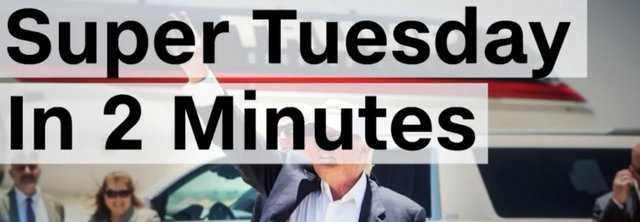
R.I.P. religious right?
By Daniel Burke, CNN Religion Editor
Was [Super Tuesday] a coming-out party for atheists or a funeral dirge for the religious right?
In an election year full of questions, Super Tuesday raised a few more, as voters in 12 states went to the polls and the GOP’s Donald Trump and Democrats’ Hillary Clinton emerged as big winners.
Exit polls can’t answer every question about Tuesday. They didn’t plumb the depth of religious commitment among Trump’s evangelical flock, or measure the size of the “God gap” between supporters of Bernie Sanders and Clinton.
But in broad strokes, the exit polls paint a picture of a radically shifting religious landscape.
With that in mind, here are four big takeaways from Super Tuesday.
1. Religious right, R.I.P.
For years, journalists have been writing the religious right’s obituary, only to see the movement rise from the grave during general elections and rally behind the GOP’s presidential candidate.
But the religious right has never seen a hammer quite like Trump, and on Super Tuesday he finally nailed the coffin shut.
In the days before Super Tuesday, conservative Christian leaders cautioned, cajoled and pleaded with evangelicals to reject Trump, saying the New York businessman epitomized the opposite of their values.
Tuesday was supposed to be the religious right’s last stand, a day when the Bible Belt would enter the voting booth and christen the most God-fearing candidate. Christian conservatives were the last best hope to halt Trump’s momentum.
They didn’t.

According to exit polls, Trump won a plurality of evangelical and born-again Christians in Alabama, Georgia, Massachusetts, Tennessee, Vermont and Virginia.
In several states, even evangelicals who said that it’s important for a candidate to share their religious values voted for Trump. That’s a direct repudiation of the message Christian leaders have been shouting from the rooftops: The thrice-married mogul more at home in casinos than churches is not one of us!
“Religious right R.I.P,” Mark Silk, a professor of religion and public life at Trinity College, wrote on Wednesday morning.
The movement died of “natural causes,” Silk said. Its founding leaders, like the Rev. Jerry Falwell, have died or retired; its organizational weight has withered; its crusades, such as the push against same-sex marriage, appear to be lost causes.
But the religious right’s fatal wounds were self-inflicted, said David Campbell, an expert on religion and politics at the University of Notre Dame.
“The religious right is reaping what they have sown: By drawing religious people into politics, people began to put their political preferences ahead of their religious values.”
2. Clinton cleans up in church
In the days before Super Tuesday, Hillary Clinton spent a lot of time in churches. Last Sunday alone, she attended two services in Memphis, where she preached about “love and kindness.”
It was a smart strategy in the South, where many voters, particularly African-Americans, are deeply devout. And it appears to have worked.
In Alabama, 92% of people who said they attend religious services more than once a week voted for Clinton. In Georgia, more than 80% of frequent worshippers broke for her. Those numbers also held in Arkansas, Tennessee, Texas and Virginia. Clinton won all of those states.

3. Democrats’ ‘God gap’
When political scientists talk about a “God gap” in American politics, they often mean the religious gulf between Christian conservatives and liberal Democrats.
In 2016, though, a sizable “God gap” has appeared within the Democratic Party itself.
As noted above, Clinton has cleaned up among the devoutly religious, not only on Super Tuesday but also in South Carolina in February.
Bernie Sanders, meanwhile, appears to be drawing deep support from people who rarely step foot inside a house of prayer.
Sanders attracted a majority of voters who don’t regularly attend worship services in Arkansas and Texas, and came close (46%) in Virginia, helping him win delegates even where he lost states.
The four states that Sanders did win — Colorado, Minnesota, Oklahoma and his home state of Vermont — all large numbers of religiously unaffiliated voters, or “nones.”
We don’t have exit poll data on voters’ religion in those states, but other polls suggest religious skeptics are breaking for Sanders.

4. Cruz’s conversion problem
Super Tuesday was supposed to be Ted Cruz’s “Southern firewall,” when evangelicals in the Bible Belt would come out in droves to support one of their own. That plan seemed successful in Texas, Cruz’s home state, and neighboring Oklahoma.
But Cruz was badly beaten by Trump among evangelicals in Alabama, Georgia, Tennessee and Virginia. (Exit polls show a virtual tie in Arkansas.) In those states, Trump bested Cruz among voters who said it’s important that a candidate shares their Christian values, evidence that the Texas senator has failed to forge an emotional connection with evangelicals.
Perhaps the main problem is that, from the first days of his campaign, the most dramatic religious conversion story Cruz has told Christians isn’t about himself; it’s about his father, Rafael.
In other words, Cruz may have a “testimony problem.”



